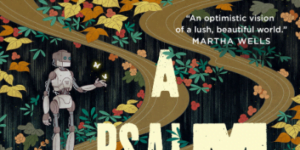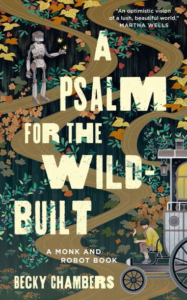
As readers and authors, we know that books matter. They help us process contemporary problems, timeless emotions, and imagine futures both desolate and hopeful. Reading fiction isn’t only an escape from real life, but an answer to it.
A Psalm for the Wild-Built answers the current crises of our present moment—climate change, automation, the wholesale destruction of our integral natural habitats—with an answer of hope and sustainability. Set 200 years into the future, Chambers presents a paradigm sometimes difficult to imagine: one where humans have “figured it out” and now live sustainably and peacefully within their environment. This change is precipitated by “the Awakening,” when all robots suddenly and unexpectedly gained consciousness. Humans (this is where the hopeful solarpunk aspect comes in)—respected this fellow consciousness and changed their entire society around it. The robots left for the wild, and humans marked out clear territories of where they would (and would not) inhabit, promising to leave the new robot society undisturbed.
When the story opens, our main hero—monk Dex—has everything they need, but still feels something is missing within their life. This urge manifests in an intense need to hear the sound of crickets, which largely went extinct before the Awakening as part of intensive, harmful impacts of humans on the natural landscape.
Dex abandons their sustainable city and quiet life as a gardener to become a tea monk, a nomad who travels the length of human settlement, listening non-judgmentally to people’s problems and offering cups of tea. (Tea-drinkers, myself included, will especially appreciate this extraordinarily comfy vision of the future.) While traveling deep into areas unvisited by humans for centuries, Dex meets an unlikely friend: a robot named Splendid Speckled Mosscap. Mosscap is on a mission to “check in” on human society on behalf of all robots, asking one specific question: “What do humans need?” As Mosscap and Dex find out together, this is a nebulous question.
A Psalm for the Wild-Built emanates warmth and comfort while simultaneously asking deep philosophical questions of morality, consciousness, and place. The premise of a society that has found peace within itself and the natural world is astonishing, and watching the highs and lows of Dex and Mosscap’s friendship is lovely to read. Chambers has already established her place within the SFF world with her Hugo-winning Wayfarers series, and Psalm for the Wild-Built is a wonderful continuation of her signature style. For more (cozy) adventures with Dex and Mosscap, check out the recently released second installment of the Monk and Robot duology: A Prayer for the Crown-Shy.
Carla Nordlund is a freelance developmental editor, book coach, and writer. She works with authors of fantasy, historical fiction, and romance to strengthen both their manuscripts and writing practice. You can find her on Twitter at @silverrunedit for writing tips and puppy nose boops; and at Silver Run Editing to collaborate on a developmental edit, manuscript assessment, beta read, or coaching.

